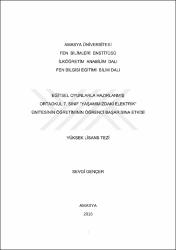| dc.contributor.advisor | Karamustafaoğlu, Orhan | |
| dc.contributor.author | Alan, Sevgi | |
| dc.date.accessioned | 2022-03-09T14:55:58Z | |
| dc.date.available | 2022-03-09T14:55:58Z | |
| dc.date.issued | 2016 | |
| dc.identifier.uri | https://tez.yok.gov.tr/UlusalTezMerkezi/TezGoster?key=DPTyuy3wRPq_qvCPSqUB644jB5PLlqvpG8N3IRoyLmCHY40vV8DSAhlj4lwFPVE4 | |
| dc.identifier.uri | https://hdl.handle.net/20.500.12450/1763 | |
| dc.description.abstract | Bu araştırmada, ortaokul 7. sınıflarda Fen ve Teknoloji dersi 'Yaşamımızdaki Elektrik' ünitesinde uygulanan, Eğitsel Oyunlarla desteklenmiş 5E yönteminin yapılandırmacı öğrenme yaklaşımıyla uygulandığı deney grubu ile yapılandırmacı yaklaşımı esas alan öğretim yönteminin uygulandığı kontrol grubunun akademik başarıları arasında anlamlı bir fark olup olmadığını tespit etmek amaçlanmıştır. Araştırmanın amacı doğrultusunda araştırmada nicel yaklaşımlardan yarı deneysel yöntem kullanılmıştır. 2013-2014 eğitim öğretim yılında Amasya iline bağlı bir devlet ortaokulunun 7. sınıfına devam eden 106 öğrenci araştırmanın evrenini oluşturmaktadır. Evrene uygulanan ön test sonucunda elde edilen başarı puanlarına bakılarak var olan gruplar arasından 7-A sınıfı deney grubu, 7-B sınıfı ise kontrol grubu olarak belirlenmiştir. 42 öğrenciden oluşan örneklemin evreni temsil etme yüzdesi % 40 olarak tespit edilmiştir. Pilot uygulama sonrası son halleri verilen eğitsel oyunlar "Yaşamımızdaki Elektrik" ünitesi süresince 5E öğrenme modelinin evrelerine yerleştirilerek deney grubuna uygulanmıştır. Uygulamalar sonunda deney ve kontrol grubuna başarı testi son test olarak uygulanmış ve sonuçlar SPSS programında analiz edilmiştir. Analiz sonuçlarına göre eğitsel oyunların uygulandığı deney grubunun son test başarı puanları ile kontrol grubunun son test başarı puanları arasında deney grubu lehine anlamlı bir fark olduğu görülmüştür. Bu sonuç, eğitsel oyunların Fen ve Teknoloji öğretiminde kullanılmasının akademik başarıyı arttırmada etkili olduğunu göstermektedir. Bu doğrultuda eğitsel oyunların uygulayıcısı olan öğretmenlere ve bu alanda çalışma yapmayı düşünen araştırmacılara önerilerde bulunulmuştur. | en_US |
| dc.description.abstract | In this study, it is aimed to compare the academic success to see if there is any meaningful difference between the control and the experimental groups that received constructive approach supported by 5E method with educational games on the unit 'Electricity In Our Daily Life' at 7th grade. Related to the aim of this research, semi-experimental design method was used. The sample of the research consists of 106 students attending to aprimary school in Amasya in the 2013-2014 academic year. Based on the pre-test results given to the students, the class 7A was accepted as the experimental group and 7B as a control group.It was determined that the representation ratio of the sample which includes 42 students, which covers the universe is %40. After the pilot application,the educational games were placed into the steps of the 5E learning model of the sample and applied to the experimental group during the unit 'Electricity in Our Daily Life'. Following to all applications, the successes of the experimental and control groups were given as a post-test and the results were analyzed in SPSS program. Related to the obtained results, there is a meaningful difference in favor of the experimental group that received educational games. This result indicates that it is necessary to give educational games to the students in teaching of Science and Technology to increase the academic success. In this context, some suggestions are given to the teachers who apply educational games and the academicians who would like to make researches in this field of science. | en_US |
| dc.language.iso | tur | en_US |
| dc.publisher | Amasya Üniversitesi | en_US |
| dc.rights | info:eu-repo/semantics/openAccess | en_US |
| dc.subject | Eğitim ve Öğretim | en_US |
| dc.subject | Education and Training | en_US |
| dc.title | Eğitsel oyunlarla hazırlanmış ortaokul 7. sınıf "Yaşamımızdaki elektrik" ünitesinin öğretiminin öğrenci başarısına etkisi | en_US |
| dc.title.alternative | The effect of 'electricity in life' unit of 7th grade in primary schools to student success which has been prepared with educational games | en_US |
| dc.type | masterThesis | en_US |
| dc.department | Enstitüler, Fen Bilimleri Enstitüsü, İlköğretim Ana Bilim Dalı | en_US |
| dc.identifier.startpage | 1 | en_US |
| dc.identifier.endpage | 77 | en_US |
| dc.identifier.yoktezid | 456123 | en_US |
| dc.institutionauthor | Alan, Sevgi | |


















